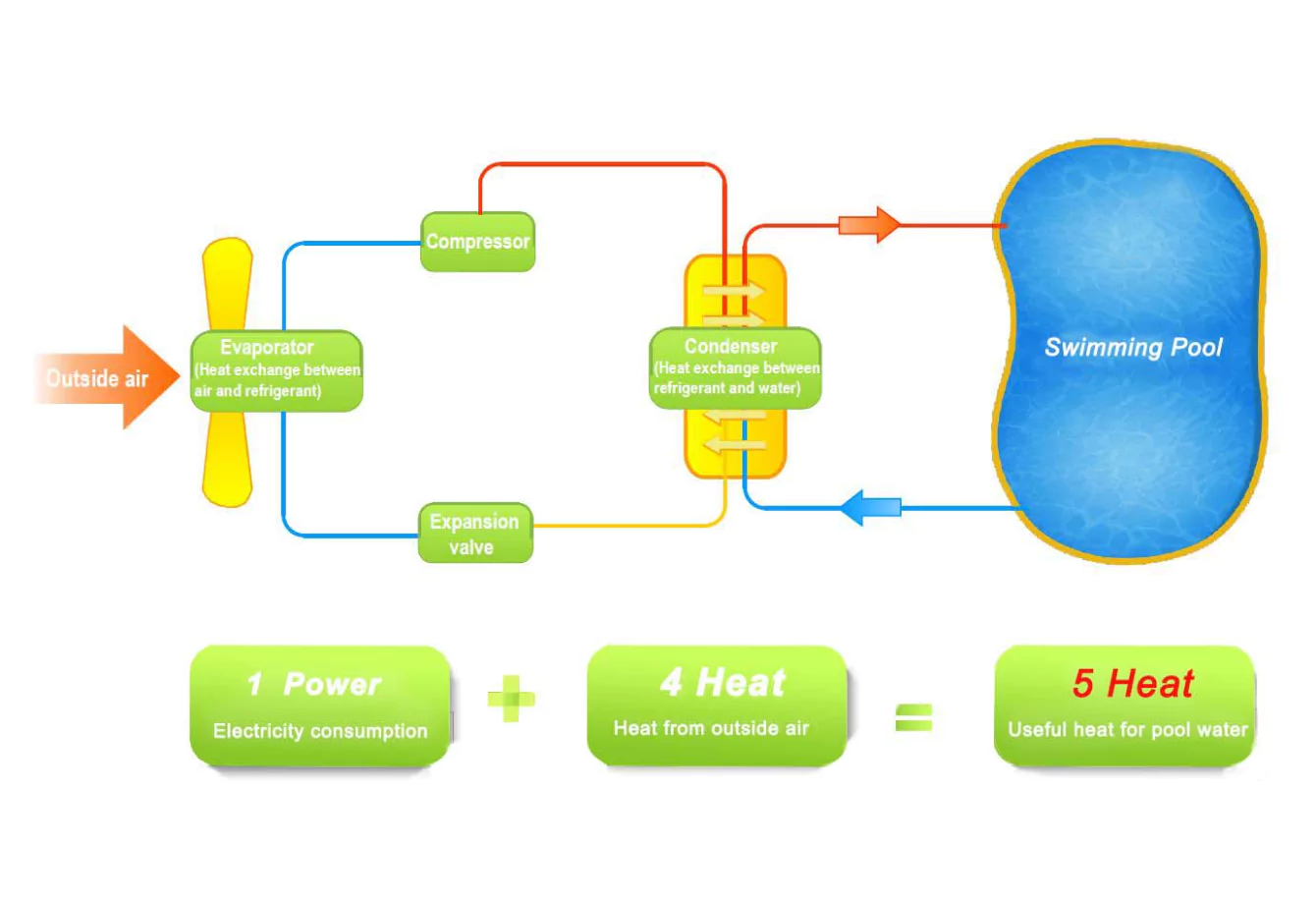Quick Comparison: Pool Heat Pump vs Gas Heater
| Feature | Pool Heat Pump | Gas Heater |
|---|---|---|
| Initial Cost | $2,000 – $6,500 USD | $1,500 – $6,000 USD |
| Annual Operating Cost | Up to $400 SAVINGS | Higher costs |
| Heating Speed | Slower | Up to 2x faster |
| Efficiency | 500-600% efficient | 80-90% efficient |
| Environmental Impact | Zero emissions | Produces CO2 |
💡 Quick Answer: Pool heat pumps cost more upfront but save up to $400 yearly. They’re perfect for mild climates and eco-conscious pool owners who want long-term savings.
Key Takeaways: What You Need to Know About Pool Heat Pumps
The Bottom Line Facts
Here are the most important things about pool heat pumps that every pool owner should know:
- Super Efficient: Pool heat pumps are 5-6 times more efficient than regular electric heaters
- Money Savers: Despite higher upfront costs, you can save up to $400 each year on heating bills
- Climate Dependent: They work best when it’s warmer than 50°F outside
- Eco-Friendly: Zero direct emissions make them the greenest pool heating option
- Patient Heating: They heat pools slower than gas heaters but maintain temperature better

Pool heat pump efficiency ratings show 500-600% efficiency compared to traditional heating methods
Complete Pool Heat Pump Pros and Cons Analysis
The Amazing Benefits of Pool Heat Pumps
Pool heat pumps offer several fantastic advantages that make them increasingly popular among smart pool owners:
Energy Efficiency That Saves Money: With a COP between 5 and 6, these units deliver incredible value. For every dollar you spend on electricity, you get $5-6 worth of heating power.
Environmental Hero Status: Pool heat pumps produce zero direct emissions. Unlike gas heaters that burn fuel and release CO2, heat pumps simply move heat around using clean electricity.
Consistent Temperature Control: Once your pool reaches the desired temperature, heat pumps maintain it perfectly. They work steadily without the on-off cycling that gas heaters experience.
Bonus Cooling Feature: Many newer models can actually cool your pool water during hot summer days. This dual functionality makes them perfect for year-round pool comfort.
The Honest Drawbacks to Consider
However, pool heat pumps aren’t perfect for every situation. Here are the challenges you should know about:
Higher Upfront Investment: Expect to pay $2,000-$6,500 for the unit itself, plus installation costs. This initial expense is definitely higher than gas heaters.
Slower Heating Speed: Patience is required! Gas heaters can heat your pool up to twice as fast as heat pumps. If you want to jump in quickly after turning on the heater, gas might be better.
Temperature Dependency: When outdoor temperatures drop below 50°F, heat pump efficiency decreases significantly. In very cold climates, they might struggle to heat your pool effectively.
“While heat pumps have higher initial costs, the long-term operational savings often justify the investment, especially in moderate climates where they perform optimally,” explains Mark Rodriguez, Senior Pool Technician with 15 years of experience.
Electricity Bill Impact: Although more efficient than electric resistance heaters, heat pumps will still increase your electricity bills, particularly for larger pools or frequent use.
Is a Pool Heat Pump Right for You? Decision Framework
Climate Considerations: The Make-or-Break Factor
Your local climate plays the most crucial role in determining pool heat pump effectiveness. These systems work exceptionally well in areas where temperatures stay above 50°F most of the year. However, their efficiency drops dramatically in colder climates.
If you live in Florida, California, or similar warm regions, pool heat pumps are excellent choices. Conversely, if you’re in northern states with harsh winters, you might need a backup heating system or consider alternative options.
Future Technology Developments
Smart technology integration is revolutionizing pool heat pump functionality. Modern units feature WiFi connectivity, smartphone apps, and integration with popular home automation platforms. These features allow remote monitoring, scheduling, and energy optimization.
Furthermore, manufacturers are developing variable-speed compressors and improved refrigerants that maintain efficiency in lower temperatures. These innovations are expanding the geographic viability of heat pumps, making them suitable for more diverse climate conditions.
IoT-enabled predictive maintenance is another emerging trend, where heat pumps can self-diagnose issues and alert homeowners before problems become costly. This technology promises to extend equipment life and optimize performance automatically.
Conclusion: Making the Smart Choice for Your Pool Heating Future
Key Decision Factors Recap
Pool heat pumps offer an exceptional combination of energy efficiency, environmental benefits, and long-term cost savings that make them ideal for most pool owners in moderate climates. With their impressive 500-600% efficiency rating and potential annual savings of up to $400, they represent a smart long-term investment.
However, they’re not perfect for every situation. If you live in a very cold climate, need rapid heating capabilities, or have significant upfront budget constraints, you might want to consider alternative heating methods or hybrid solutions.


